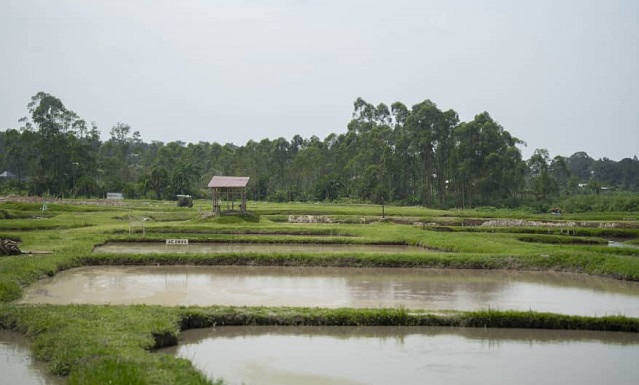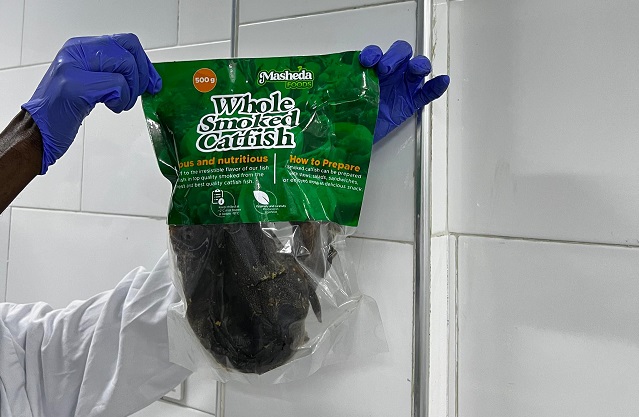
Mityana, Uganda | THE INDEPENDENT | In recent years, catfish has emerged as a nutritional force and a sustainable source of protein, particularly in regions like Uganda, where aquaculture is gaining traction as a viable solution to food security challenges.
Catfish is a resourceful and nutrient-dense fish that has long been a staple in many diets worldwide. Its nutritional profile makes it an excellent choice for health-conscious consumers.
According to studies, a 100-gram serving of catfish provides approximately 18 grams of protein, making it an ideal source of lean protein for muscle repair, growth, and overall bodily function.
In addition to protein, catfish is rich in omega-3 fatty acids, essential fats that play an important role in brain health, reducing inflammation and lowering the risk of chronic diseases such as heart disease and arthritis.
Kamara Daniel, a Nutritionist at Bwindi Community Hospital, says that catfish is also a good source of essential vitamins and minerals. It is particularly high in vitamin B12, which is important for nerve function and the production of DNA and red blood cells.
“A single serving of catfish can provide more than 100% of the recommended daily intake of vitamin B12. Additionally, catfish contains notable amounts of selenium, a powerful antioxidant that supports the immune system, and phosphorus, which is essential for bone health”.
“Unlike fatty cuts of meat, catfish is low in saturated fats, which makes it a heart-healthy option,” Kamara adds.
Uganda’s aquaculture sector has seen major growth over the past decade, with catfish farming playing an essential role.
The country’s abundant water resources, including lakes, rivers, and ponds, provide an ideal environment for fish farming. Catfish, in particular, has become a popular choice among farmers.
Traditional fishing methods in Uganda have often led to overfishing and the depletion of natural fish stocks in lakes. Catfish farming offers a sustainable alternative, reducing pressure on wild fish populations while providing a reliable source of income for rural communities.
Catfish is one of the two common fish species being farmed in Uganda due to its fast growth rate, disease resistance, aerial respiration, high feed conversion efficiency, acceptability of a variety of food items, resistance to handling stress, high stocking density and good local and regional market. It also has great potential to address nutritional security and household incomes.
However, the industry faces challenges such as limited access to quality feed, inadequate training for farmers, and poor infrastructure for processing and distribution.
This is where companies like Masheda Foods are making a difference. By promoting sustainable catfish farming practices, Masheda Foods is not only improving the livelihoods of farmers but also ensuring that consumers have access to high-quality, nutritious catfish.
Located in the serene countryside of Buyala, off Mityana Road, Masheda Foods’ catfish farm is evidence of the potential of sustainable aquaculture. Spread across several acres, the farm features a series of well-maintained ponds, each swarming with healthy, thriving catfish. The ponds are designed to mimic natural water ecosystems, with controlled water flow and aeration systems to ensure optimal conditions for the fish.
“We are committed to delivering the freshest, highest-quality catfish products while setting the standard for excellence in fish processing,” says Sherina Ainembambazi, Co-CEO of Masheda Foods.
“Our vision is to become the leading choice for consumers seeking nutritious catfish products and setting the bar for excellence in the industry.”
The farm’s sustainable practices include regular water quality testing, controlled feeding schedules, and the use of probiotics to promote gut health in fish.


A short distance from the ponds lies Masheda Foods’ state-of-the-art catfish processing factory. This facility is where freshly harvested catfish are transformed into convenient, ready-to-cook products without compromising their nutritional integrity.
The factory is a hive of activity, with workers meticulously cleaning, filleting, and packaging catfish in a hygienic environment. The use of vacuum-sealing technology extends the shelf life of the fish while retaining its freshness and nutritional value.
The factory also produces smoked catfish, a popular product in Uganda that adds variety to the market while preserving the fish’s essential nutrients.
Charles Wamulambi, the quality assurance manager at the Masheda factory, highlights the importance of value-added processing.
“Value-added processing is a game-changer for the catfish industry. It allows us to deliver high- quality catfish to consumers in urban and rural areas alike. Our smoked catfish, for example, is not only delicious but also retains all the nutritional benefits of fresh catfish.”
In addition to traditional products, Masheda Foods is exploring innovative ways to incorporate catfish into everyday meals. The company has developed catfish sausages and burger patties, which provide a convenient and nutritious alternative to processed meats.
“These products are particularly appealing to busy families and young professionals who are looking for healthy, easy-to-prepare meal options,” Wamulambi adds.
Marvin Lwasa, the Managing Director of Masheda Holding Ltd, says that, unlike many farmers who sell fresh catfish, Masheda Foods produces high-quality fish products that meet both local and international standards.
“We are excited to meet the evolving needs of health-conscious consumers with innovative and nutritious catfish products, all while advancing our sustainability efforts.”
 The Independent Uganda: You get the Truth we Pay the Price
The Independent Uganda: You get the Truth we Pay the Price




Very dry sturbed
Such a beautiful story
Then KCCA has bought some land in the same area for the purpose of dumping
The waste has not been sorted at site of generation so urt comprises chemical, e- waste then some liquid will come from waste
Are your ponds up stream
This place of uncertainities